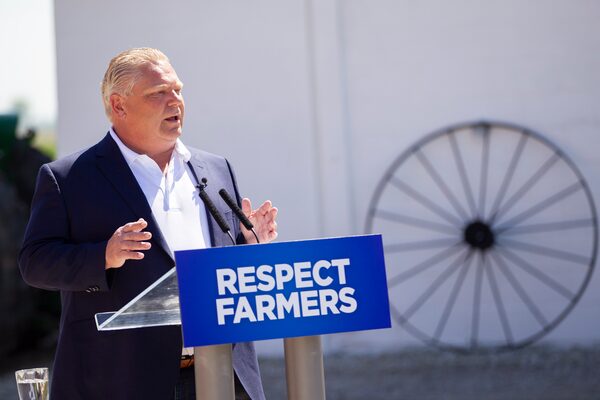As they vie to become Ontario’s next premier, Andrea Horwath and Doug Ford are looking to mine the same vein of voter discontent – only from opposite ends of the political spectrum. Where the two meet is at a disappointing conclusion: fiscal discipline will get tossed aside in the interest of satisfying what disillusioned voters crave.
At the root of the campaigns of both Ms. Horwath, the provincial NDP leader, and Mr. Ford, her Progressive Conservative counterpart, is something that has become common in postfinancial-crisis politics. It’s the perception among voters that, while the economy has recovered, their own well-being has not. They feel they’re being left out and someone else is to blame for that.
The party to be blamed is, obviously, the incumbent Ontario Liberals under Kathleen Wynne. From Ms. Horwath’s standpoint, the Liberals cut services and starved important programs. From Mr. Ford’s perspective, the Liberals overtaxed and overspent, picking voters’ pockets. Both argue that the government has left too many Ontarians worse off, despite years of economic strength that should have improved voters’ lot. Both claim they’re going to right this wrong.

Ontario PC leader Doug Ford makes an announcement Wednesday.Geoff Robins/The Canadian Press
But that comes with a price tag. If you want to replace the current government with one with a deeper sense of fiscal responsibility – one that will end years of red ink – neither of these parties is offering that. Both have demonstrated that minding the purse strings is well down their list of priorities.
Just like the Liberals, the NDP and the PCs have laid out plans that will plunge the province back into deficits (albeit modest ones), kicking the idea of balanced budgets to the curb in favour of a series of expensive election promises. And just like the Liberals, neither has presented a plan to tackle the biggest fiscal elephant in the room: the province’s net debt of $300-billion-plus, and growing.
Ms. Horwath is at least forthright about it. In a meeting with The Globe and Mail’s editorial board Wednesday, she acknowledged that the provincial debt was a concern, and even argued that the more than $12-billion that Ontario pays annually in interest on its debt would be much better spent on programs.
But she nevertheless said that her party’s “priority” is to deliver more help to average Ontarians – so that they better share in the benefits of the strong economy, and to “ensure that people have hope for the future,” as she put it. And she’s willing to continue to add to the already onerous debt to do it.
The fiscal plan contained in the NDP’s official platform projects budget deficits totalling $25-billion over the next five years (including the current fiscal year). The platform contains no plan to return to balance, and no plan for reducing the province’s debt in the longer term.
At least the NDP have a formal platform. Mr. Ford’s Tories have yet to publish such a document, leaving the cost of the party’s platform largely to educated guesswork. But while Mr. Ford talks a good game about the need to balance the budget and rein in the debt, the growing list of election promises that he has rolled out over the past two weeks suggests that fiscal constraint isn’t high on his agenda, either.
His promised tax cuts – to gasoline taxes, to corporate and small-business taxes, to middle-class income taxes, to carbon taxes – will cost the province billions a year in foregone revenue. Economist Mike Moffatt, who has been tracking Mr. Ford’s tax and spending promises, estimates that the platform the PCs have rolled out so far will dig an annual hole of about $6-billion to $7-billion in the budget.
That’s on top of the deficit of roughly $6.6-billion a year that the Liberals projected in their pre-election budget this spring, of which Mr. Ford has been loudly critical and has vowed to eliminate. Every day of the campaign that goes by, a balanced budget moves further from Mr. Ford’s reach.
And remember that these are campaign promises that are being made in relatively rosy economic times. We’re now nine years into the post-Great Recession economic expansion. That’s a long-in-the-tooth business cycle.
History suggests that the next Ontario government is unlikely to cruise through its first term without a significant economic slowdown, if not an outright recession. If and when that happens, how will these parties, should they form the government, reconcile their expensive promises with the reality of slowing revenues? What will happen to their promises, their deficits, and the government’s debt burden?
Don’t expect either to talk about such rainy-day scenarios during this campaign. When you’re busy rolling out the promises to buy alienated voters all the things they feel they are owed, there’s little room for such doses of reality. Or, sadly, for a credible discussion about fiscal policy.
 David Parkinson
David Parkinson